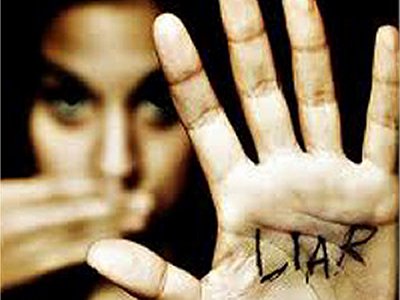
ARE WE ALL BORN LIARS?
Deceiving others is more a part of our common life than we like to think and it’s not just other people who do it.
One of the worst judgments we can make of another person in public is that they are a liar. It implies untrustworthiness, challenging their integrity like few other criticisms. Few people meekly accept such an allegation and will vehemently contest it. The strange truth is, we are all liars. The idea that some people live in a bubble of unapproachable probity is not borne out by the evidence. Lies drift around and between us like dust particles in the atmosphere. Only when the light is let in may we see their reality; mostly we do not take them into account.
Ian Leslie has written a stimulating and provocative book Born Liars (Quercus, 2011) in which he addresses the greatest lie of all: that we can be relied on to tell the truth. Although cultures demonstrate consistently their disapproval of lies as a way of reinforcing social norms, what constitutes a lie may differ from place to place, especially when it comes to the grey area of the white lie. Western individualism produces citizens who are more likely to lie to protect the person against the group; eastern collectivism, citizens who will protect the group against the person. Out of such apparent relativism are political arguments formed.
Everyone who engages with others socially is, to one extent or another, living a lie as they wear a mask to project the image they wish. Some visages are more acceptable than others: the discipline of controlling a temper is preferable to the hypocrisy of being pleasant to someone while traducing them mercilessly out of earshot. Yet both are common and unexceptional experiences. The ability to deceive others is an uncomfortable trait which is practised regularly and unselfconsciously as a way of protecting oneself and, sometimes, keeping a competitive advantage.
This is disturbing terrain for the Christian. The very act of humanity’s estrangement from God in the creation story is predicated on a calculated lie. Pauline theology contrasts the truth of the Gospel with the lies we construct against its effects and the devil is described as the deceiver and the father of lies. Yet defining biblical stories contain elements of apparent deception: God leads Abraham up the mountain to sacrifice his son Isaac without any intention of making him; the Egyptian midwives deceive Pharoah in order to preserve Hebrew children; Samuel arrives in Bethlehem to anoint David as king of Israel but tells the elders, who are nervous of Saul, that he has come to sacrifice to the Lord. Even Jesus is in no rush to reveal himself on the road to Emmaus to followers who are grieving his death.
Perfect and transparent honesty may be the greatest aspiration, but the goal of not causing harm by our deceptions in life may be a more realistic one. It was the commitment of Nollie ten Boom to the former state which led her to inform the Nazis who had broken into her house that the woman she was sitting with was Jewish and the adherence of Corrie ten Boom to the latter goal which led her to lie some time later to the Nazis that there were no Jewish people in the house, despite the hidden presence of four of them.
Most of us have witnessed other people tell brazen lies at some point and wondered how they could be conveyed so shamelessly and sincerely. The first step to deceiving others is the ability to deceive ourselves, which may explain how people manage this. By the same standard, we may be convincing ourselves of our own lies so effectively that we are unable to detect their influence over us.
None of this is a counsel of despair or an encouragement to sin; rather, it should exhort us to the kind of self-examination which is the foundation of Christian discipleship. We are called to personal faith in God, but it is sometimes allied to an unattractive certainty about our personal causes. In dispute with others, those who blithely assume they are right are most at risk of being wrong. The discipline of personal reflection, when informed by the Spirit of God, is more likely to arrive at truth than an unthinking rebuttal of the allegation made against us.
Yet in the midst of our deceptions, we are called to trust one another. It is commonly believed that those who are more cynical and suspicious of others are better able to unmask a liar than the more trusting among us. Yet controlled experiments have shown the reverse to be true. While it is notoriously hard to discern when someone else is lying (partly because the clues are not consistent across people and cultures), those who are more trusting of others are likelier to succeed. This may sound counter-intuitive, but those who trust tend to relate better to others socially. In such manner, experience in the ways of others is built up, in distinction to those who warily keep their distance.
Truth and lies are no abstract concepts, but formed in the relationship one to another. This is why they have such power to preserve us or to harm us and why they matter so very much
POPULAR ARTICLES

Obama's Covert Wars
The use of drones is going to change warfare out of all recognition in the next decades.

Through A Glass Starkly
Images of traumatic incidents caught on mobile phone can be put to remarkable effect.

What Are British Values?
Is there a British identity and if so, what has shaped the values and institutions that form it?


